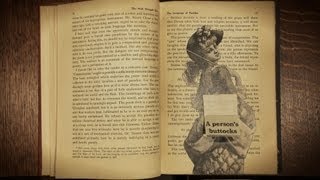(单词翻译:单击)
Mysteries of vernacular: Keister, a person's buttocks.
通用俗语的谜团:Keister,是指人的臀部。
Though the modern meaning of keister refers somewhat indecorously to a person's behind,
“Keister”的现代用法是用来有点无礼地指代人的臀部,
the word's history does not begin with the rear end.
但这个词一开始并不是指“后面”。
Instead, it can be traced back to the Proto-Indo-European kista, which described a woven container.
相反,它可以追溯到原始印欧语“kista”,意思是指编织的容器。
Kista influenced the creation of words like the Greek kiste, meaning basket or box,
“Kista”影响了很多词的创造,例如希腊语的“kiste”,意思是筐和盒子,
and later, the Latin cista, which meant box or chest.
以及后来的拉丁语词汇“cista”,意思是盒子和箱子。
In proto-Germanic, a sturdy, box-like container was described by the word kista, which eventually gave us chest in English.
在原始德语中,结实而像盒子的容器是用“kista”来表述,而这个词后来变成了英语的“chest”。

For every locked chest, there is both a key and a lock pick,
凡是上锁的箱子,相对应的总是一把钥匙和一把撬锁工具,
and the history of keister draws us into this world of petty crime and speculative etymology.
而“keister”的历史也将我们带入这个稍微违法的领域和推理词源学的范畴。
Keister may have come from the British dialect kist, which was the northern form of chest.
“Keister”有可能来自英国方言“kist”,也就是“chest”的北方版本。
In the underworld jargon of the late 1800s, it referred to a burgler's tool kit that can be locked,
在19世纪后期的地下黑话中,这个词是指能上锁的偷盗工具箱,
and by the early 20th century, it meant safe or strong box.
而在20世纪早期,它的意思是指保险箱。
Numerous theories about keister's connection to the buttocks abound, one being, that is courtesy of the slang sense,
有很多理论能解释“keister”和屁股的联系,其中一个是,在俚语中,
used by pick-pockets to describe the treasure of a rear trouser pocket.
小偷用这个词来描述裤子后兜里的东西。
Unfortunately, what isn't safe in your kist may not be safe near your keister either.
很遗憾,在你“kist”中不保险的东西,在你“keister”的附近可能也不保险。


